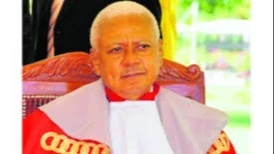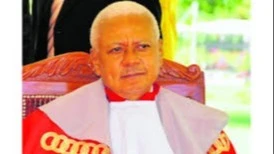Criminal justice commission touts compliance with legal procedures

LAST week, we briefly looked at some of the recommendations of the criminal justice commission formed by President Samia Suluhu Hassan and launched on January 31, 2023. The commission was chaired by retired Chief Justice Mohamed Chande Othman, and its aim was to look into criminal justice issues and recommend how to improve the criminal justice system and make criminal justice institutions more effective.
The recommendations focused on complaints Tanzanians have on the criminal justice system and criminal justice institutions in the country in relation to good governance and civil rights.
One of the areas touched was abuse of power. In particular, the commission decried false imprisonment as challenged in Rev Christopher Mtikila v State Attorney and in Mary Peter Otaru v Onesmo Buswelo and Others. In the latter case, the High Court of Tanzania ordered the government to compensate the aggrieved party Sh90 million in relation to unlawful custody the complaint was subjected to under the direction of a district commissioner.
Today, I invite you to continue looking at some issues raised by the criminal justice commission in relation to the abuse of power contrary to the provisions of the Regional Administration Act (Chapter 97) and the National Security Council (Chapter 61). Section 7 of the Regional Administration Act provides that a regional commissioner shall have power to cause to be arrested any person who in his or her presence commits or to his or her knowledge has committed any offence for which a person may be arrested and tried.
Likewise, section 15 of the Act provides that a district commissioner shall have power to order or cause to be arrested any person who in his or her presence commits, or to his or her knowledge has committed, any offence for which a person may be arrested and tried.
But the criminal justice commission finds out that some regional and district commissioners abuse those provisions to the extent that some of the suspects are subjected to false imprisonment.
Thus, the commission recommends restraining regional and district commissioners’ abuse of power, and any leader who defies legal directives be personally liable if an aggrieved person files a court case against him or her. In this case, the leader who abuses his or her powers shall be personally held responsible and the government shouldn’t be part of it.
The commission also recommends that the regional and district commissioners shouldn’t be accompanied by security committee members out of necessity and they shouldn’t be introduced as chairpersons of security committees.
In addition to this, police officers and other executives who abuse their powers should be disciplined, and citizens should be enlightened to know their rights in the criminal justice system.
The commission also looks into the powers of executives and council officers stipulated in the Local Government (Urban Authorities Act) Chapter 288 as the Act authorises Urban Directors to deal with crime.
The provisions of section 74(1)(a) and (b) of the Act authorise a director who is informed that any person has committed a criminal offence to arrest the person and be taken to court. Moreover, the director shall have and may exercise and perform all powers and duties which are by law conferred or imposed upon police officers.
Section 100 of the Act authorises a director or ward executive to arrest any person who commits an offence contrary to council by-laws made by an urban authority in his or her presence. The Act also authorises a regional or district commissioner to give a permit to those officers to detain a suspect until he or she is taken to court.
In relation to these provisions, the commission recommends the police powers extended to those officers to be removed from the Act, instead those powers should be exercised by the Police Force. The powers of the director and ward executive to arrest and detain a person be removed, and instead those powers should be exercised by the Police Force.
Statements given by political leaders (ministers and other government leaders) sometimes tamper with people’s rights. This situation causes complaints, especially the legitimacy of the powers exercised outside the legal bounds to direct state organs to arrest and detain people.
The commission finds that people’s complaints are well founded and it is important to look into them to strengthen the foundations of good governance and rule of law. So, the commission recommends appointing authorities to direct all leaders who don’t have legal powers to arrest to comply with legal procedures, and any leader who defies the directives should be personally held accountable and the government shouldn’t be part of the problem.
It suffices to say that complying with legal procedures puts all government leaders and institutions in a better position of serving people. Any government power should be exercised within legal provisions.
Today’s quote: “The rule of law is internationally recognized as a foundational element in guaranteeing peace, justice, human rights, effective democracy, and sustainable development.” – Dr Alejandro Ponce, Chief Research Officer, World Justice Project (WJP).
The author is a Dar es Salaam-based lawyer. He can be reached at [email protected]
Top Headlines
© 2025 IPPMEDIA.COM. ALL RIGHTS RESERVED

























